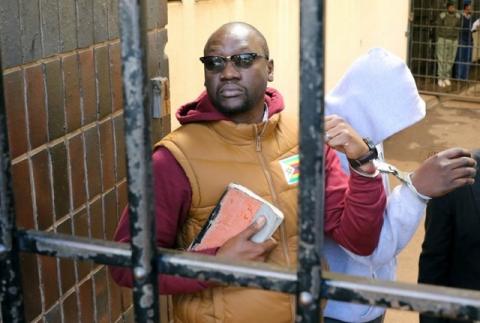Advertisement
Zimbabwe pastor on trial for subversion faces 20-year jail term
HARARE (Reuters) - An activist pastor went on trial in Zimbabwe on Monday on charges of attempting to subvert the government, following protests last year against President Robert Mugabe's handling of the economy.
Evan Mawarire faces a sentence of up to 20 years in prison if convicted, and even if acquitted could soon be on trial again.
The trial that began today stems from stay-at-home demonstrations he led last year through his #ThisFlag movement. The social-media campaign urged citizens to speak out against economic problems and government failure to pay workers.
On Sunday, Mawarire was arrested again for subversion as he stepped down from his pulpit. Police accused him of circulating social-media posts that accused the government of wrecking the economy.
Appearing in maroon slacks at the High Court, the clergyman pleaded not guilty to the 2016 charges: two counts of subverting the government and two of inciting public violence. The latter carries a penalty of up to 10 years in jail.
State prosecutor Chris Mtungadura said social media posts by Mawarire last year were meant to incite Zimbabweans to overthrow the government. The state has lined up eight witnesses.
"He was exercising his constitutional rights of challenging the policies of government. This ... was done in a lawful manner," defense lawyer Harrison Nkomo told the court.
Judge Priscilla Chigumba granted Mawarire bail, but the clergyman will remain in detention until he appears at a lower court on the charges for which he was arrested on Sunday.
Zimbabwean law automatically revokes bail at the start of a High Court trial and requires a new application.
ECONOMIC TROUBLES
Mawarire's arrests and trial come against the backdrop of a worsening Zimbabwean economy. On Monday, most service stations in Harare had run out of fuel and long queues formed at few outlets that were selling. Shortages of basic goods in the last few days have resulted in panic buying by consumers.
Cash shortages, which started last year, have worsened, with some banks unable to provide money at all to customers.
Prices of imported goods, including cooking oil and dairy products, have also risen. Businesses say they are buying foreign currency on the black market at a premium, raising fears of a return to hyperinflation.
In 2009, the government adopted the U.S. dollar as its official currency, alongside the British sterling and South African rand, which helped to stabilize prices.
But dollars have disappeared from banks, and on Monday, buying $100 on the streets via bank transfer cost $150, up from $133 a week ago, a sign that dollar bank balances are fast losing value.
The domestic quasi-currency "bond note" introduced in 2016 to try to ease shortages is also in short supply as it has been sucked out of the banking system but can be found on the street.
Although bond notes have a 1:1 face value with the U.S. dollar, one needs $1.20 in bond notes to buy $1.
Mugabe, 93, has held power since Zimbabwe won independence from Britain in 1980 and critics accuse him of using the security forces to crack down on dissent.
(Reporting by MacDonald Dzirutwe; Editing by Gareth Jones, Larry King)



















Add new comment